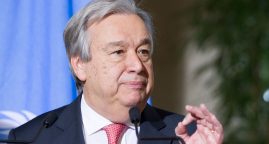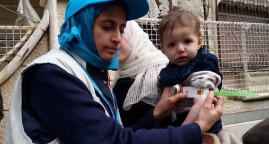ICC’s first cultural destruction trial to open in The Hague
War crimes trial of Ahmad al-Faqi al-Mahdi, accused of destroying mausoleums in Timbuktu, has begun.
The international criminal court’s first war crimes trial for destruction of cultural monuments opens this week against a jihadi leader accused of demolishing ancient mausoleums in Timbuktu. Ahmad al-Faqi al-Mahdi is accused of levelling medieval shrines, tombs of Sufi saints and a mosque dating back to the 15th century that formed part of the Unesco world heritage site in the northern Malian city.
Destruction of cultural heritage is not a second-rate crime. It’s part of an atrocity to erase a people. Mark Ellis, chief executive of the International Bar Association, specialises in war crimes cases.
Faqi, a local ethnic Tuareg, is accused of directing attacks on 10 ancient mud-brick buildings in June and July 2012. One of the desecrated sites was the Sidi Yahya mosque, built in 1440 when Timbuktu was a regional centre for learning. It contained Prof Sidi Yahya’s mausoleum.
Welcoming Faqi’s transfer to The Hague last September, the chief prosecutor Bensouda said the people of Mali “deserve justice for the attacks against their cities, their beliefs and their communities”.
“The charges we have brought against Ahmad al-Faqi al-Mahdi involve most serious crimes,” she said. “They are about the destruction of irreplaceable historic monuments, and they are about a callous assault on the dignity and identity of entire populations, and their religious and historical roots.”
Learn More
-> Read the full article on The Guardian website
-> UNESCO and ICRC partner on the protection of culture heritage in the event of armed conflict
-> Cultural property must be protected in times of war – Q&A
Related Articles
At Munich Security Conference, UN chief Guterres highlights need for ‘a surge in diplomacy for peace’
02/18/2017. “There are things that are obvious: the alignment of the sustainable and inclusive development with the sustaining peace agenda,” said Mr. Guterres
Humanitarian Principles: 50 years after their adoption, myth or effectiveness?
10/14/2015. This video (in french) raises the issue: 50 years later, humanitarian principles they still reflect a philosophy or is it that this philosophy is exceeded?
“International humanitarian law is disintegrating before our eyes”
28/03/2016. 150 years of achievement in signing up to international laws to protect civilians in conflict zones are unravelling before our eyes.






